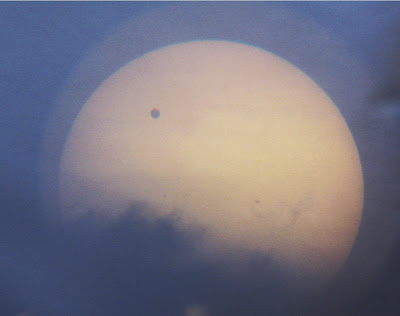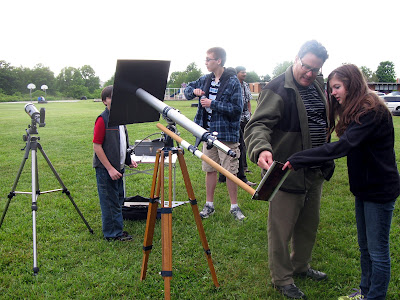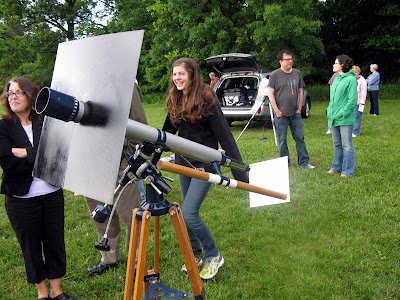Total Solar Eclipse of April 8, 2024
Observed from Highland Hts. OH, a suburb east of Cleveland in the path of totality. Despite the veil of cirrostratus, I managed to capture the sun's corona during totality, along with a prominence and a few flares. Photos were taken with a Nikon D3500, 300 mm lens, mounted on a heavy-duty tripod.
The solar projection telescope, used in previous posts (below), delivered poor images this time. Sky brightness, created by the cirrostratus, washed out much of the contrast.
Click to enlarge.
After taking some careful measurements, I created a White Dot which represents the earth to scale. Even an average size prominence dwarfs our humble earth. This prominence appears to be nearly 50,000 miles high. The sun is 109x earth's diameter. As the Psalmist pondered, "what is man that you are mindful of him...?" (Ps 8:4)
Solar Eclipse of August 21, 2017
We observed the eclipse at Tallmadge Meadows Metropark in Munroe Falls, OH. The photos are taken from the eyepiece projection screen using a 60mm Bushnell Sky Chief II telescope. I cropped, rotated, and enhanced the contrast and brightness of these images for this posting.
Click to enlarge photos.
Total Lunar Eclipse of October 8, 2014
I shot these just before dawn (around 6:40 AM EDT) as the full moon was emerging from totality, hanging low in the western sky. The scattering and refraction of light from earth's atmosphere casts a copper color over the moon's surface even when it is totally eclipsed by the earth's shadow.
Canon PowerShot A650 IS
2 sec @ f/4.5 ISO 200
Transit of Venus on June 5, 2012
This was the last Transit of Venus across the disk of the sun
that we will see in our lifetime. About 200 people attended the event
at Fishcreek Elementary school in Stow, OH, under the direction of my
friend and long-time astronomer, David Jesse.
Digital photos of the transit were taken from an eyepiece projection screen using a 60mm Bushnell Sky Chief II telescope (yes, its practically an antique!). The telescope set-up is shown in a photo below. I enhanced the contrast and brightness of the images for this posting.
The event was plagued by clouds and rain until the last 20 minutes or so when the sun finally appeared through a broken sky. The last pictures were taken as the sun was descending below the treeline.
We observed the eclipse at Tallmadge Meadows Metropark in Munroe Falls, OH. The photos are taken from the eyepiece projection screen using a 60mm Bushnell Sky Chief II telescope. I cropped, rotated, and enhanced the contrast and brightness of these images for this posting.
Click to enlarge photos.
 |
| The solar projection telescope is show in the center, mounted on a wooden tripod. |
 |
| Sunspot groups are visible near the center and the limb of the sun. |
 |
| Maximum coverage was 80% at this location. |
 |
| Telephoto shot through a solar filter (Canon PowerShot A650 IS). |
 |
| Unfiltered photo during maximum coverage as clouds briefly passed over the sun. |
Total Lunar Eclipse of October 8, 2014
I shot these just before dawn (around 6:40 AM EDT) as the full moon was emerging from totality, hanging low in the western sky. The scattering and refraction of light from earth's atmosphere casts a copper color over the moon's surface even when it is totally eclipsed by the earth's shadow.
Canon PowerShot A650 IS
2 sec @ f/4.5 ISO 200
The silhouette of a tree (right) and rooftop are barely visible in this photo:
FL 44mm | 6x Zoom:
Transit of Venus on June 5, 2012
Digital photos of the transit were taken from an eyepiece projection screen using a 60mm Bushnell Sky Chief II telescope (yes, its practically an antique!). The telescope set-up is shown in a photo below. I enhanced the contrast and brightness of the images for this posting.
The event was plagued by clouds and rain until the last 20 minutes or so when the sun finally appeared through a broken sky. The last pictures were taken as the sun was descending below the treeline.
Please note: The small dots near the middle of the disk are sunspots.






















